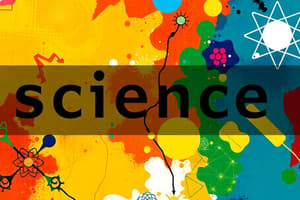Podcast
Questions and Answers
Which branch of science studies living organisms?
Which branch of science studies living organisms?
- Mathematics
- Physics
- Biology (correct)
- Chemistry
What is the first step in the scientific method?
What is the first step in the scientific method?
- Hypothesis
- Observation (correct)
- Analysis
- Question
Which of the following best describes a hypothesis?
Which of the following best describes a hypothesis?
- A collective conclusion drawn
- A proposed explanation that can be tested (correct)
- A proven fact
- A statement of natural law
Which of the following is NOT a key concept in science?
Which of the following is NOT a key concept in science?
What is the purpose of analysis in the scientific method?
What is the purpose of analysis in the scientific method?
What do natural sciences typically focus on?
What do natural sciences typically focus on?
Which of the following disciplines belongs to formal sciences?
Which of the following disciplines belongs to formal sciences?
What is a dependent variable in an experiment?
What is a dependent variable in an experiment?
What is one of the key roles of science in society?
What is one of the key roles of science in society?
Which step comes after hypothesis in the scientific method?
Which step comes after hypothesis in the scientific method?
Flashcards are hidden until you start studying
Study Notes
Definition of Science
- Systematic study of the natural world.
- Involves observation, experimentation, and analysis.
- Aims to develop explanations and predictions.
Main Branches of Science
-
Natural Sciences
- Focus on the physical world.
- Includes:
- Physics: Study of matter and energy.
- Chemistry: Study of substances and their reactions.
- Biology: Study of living organisms.
-
Formal Sciences
- Concerned with abstract systems and logic.
- Includes:
- Mathematics: Study of numbers, quantities, and shapes.
- Statistics: Study of data collection and analysis.
- Computer Science: Study of algorithms and data structures.
-
Social Sciences
- Study of human behavior and societies.
- Includes:
- Psychology: Study of the mind and behavior.
- Sociology: Study of social behavior and structures.
- Economics: Study of production, distribution, and consumption.
Scientific Method
- Observation: Identifying phenomena of interest.
- Question: Formulating a question based on observations.
- Hypothesis: Proposing a testable explanation.
- Experimentation: Conducting experiments to test the hypothesis.
- Analysis: Interpreting data collected.
- Conclusion: Drawing conclusions based on the analysis.
- Communication: Sharing results with the scientific community.
Key Concepts in Science
- Theory: A well-substantiated explanation of phenomena.
- Law: A statement describing a consistent natural occurrence.
- Hypothesis: A proposed explanation that can be tested.
- Variable: Any factor that can change in an experiment.
- Independent Variable: Manipulated by the researcher.
- Dependent Variable: Measured response.
Importance of Science
- Drives technological advancement.
- Informs public policy and decision-making.
- Enhances understanding of the universe and our place in it.
- Promotes critical thinking and problem-solving skills.
Ethical Considerations
- Responsible conduct in research.
- Importance of peer review and reproducibility.
- Ethical treatment of subjects and the environment.
Current Trends in Science
- Interdisciplinary research combining multiple fields.
- Emphasis on sustainability and environmental science.
- Advancements in artificial intelligence and biotechnology.
- Growing role of data science in research.
Definition of Science
- Systematic study aimed at understanding the natural world.
- Utilizes methods of observation, experimentation, and analysis.
- Seeks to formulate explanations and predictions about natural phenomena.
Main Branches of Science
-
Natural Sciences: Concentrates on the physical universe.
- Physics: Investigates matter and energy interactions.
- Chemistry: Studies substances and their chemical reactions.
- Biology: Explores living organisms and their processes.
-
Formal Sciences: Deals with abstract concepts and logical reasoning.
- Mathematics: Focuses on numbers, quantities, and geometric shapes.
- Statistics: Involves data collection, analysis, and interpretation.
- Computer Science: Concerned with algorithms and information processing.
-
Social Sciences: Examines human behavior and societal structures.
- Psychology: Studies mental processes and behavior.
- Sociology: Analyzes social interactions and group dynamics.
- Economics: Investigates the production, distribution, and consumption of goods and services.
Scientific Method
- Observation: Identifying phenomena to study.
- Question: Formulating inquiries based on observations made.
- Hypothesis: Suggesting a testable explanation for the observed phenomena.
- Experimentation: Conducting tests to evaluate the hypothesis.
- Analysis: Interpreting data obtained from experiments.
- Conclusion: Drawing inferences from the analysis results.
- Communication: Sharing findings with the scientific community for peer review.
Key Concepts in Science
- Theory: A comprehensive explanation backed by substantial evidence.
- Law: A statement detailing a consistent occurrence in nature.
- Hypothesis: An initial, testable proposal intended to explain phenomena.
- Variable: Any factor that can alter during experimentation.
- Independent Variable: The factor manipulated by the researcher.
- Dependent Variable: The factor that is observed and measured.
Importance of Science
- Fuels technological advancements that benefit society.
- Guides public policy and decision-making through research findings.
- Expands our understanding of the universe and humanity's role within it.
- Cultivates critical thinking and problem-solving capabilities among individuals.
Ethical Considerations
- Emphasizes responsible conduct in scientific research.
- Highlights the importance of peer review processes and reproducibility.
- Stresses ethical treatment of participants and environmental sustainability.
Current Trends in Science
- Rise of interdisciplinary research that merges various scientific fields.
- Focus on sustainability initiatives within environmental science.
- Breakthroughs in artificial intelligence and biotechnology.
- Increasing significance of data science in research methodologies.
Studying That Suits You
Use AI to generate personalized quizzes and flashcards to suit your learning preferences.




